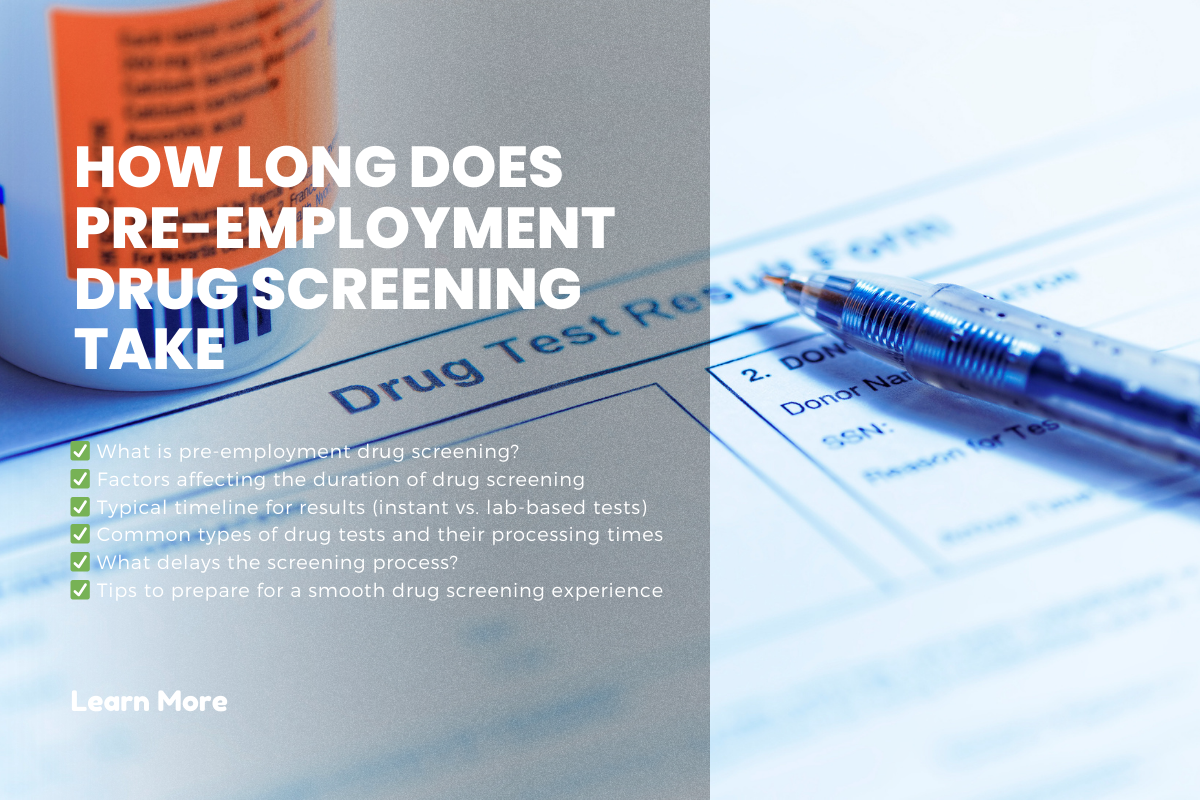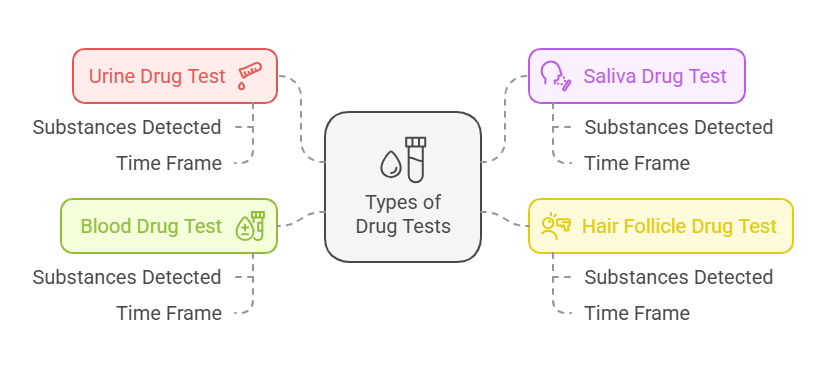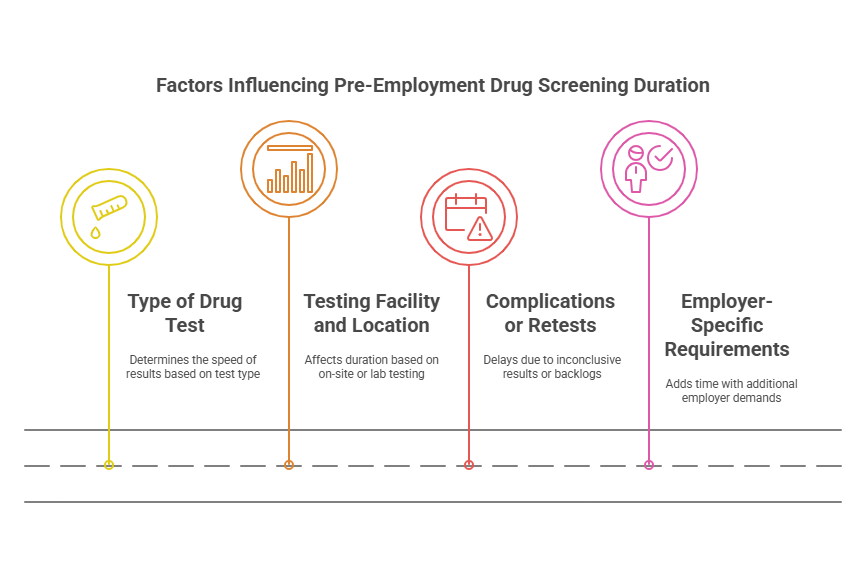
Table of Contents
ToggleUnderstanding Pre-Employment Drug Screening
Pre-employment drug screening refers to the process of testing job candidates for drug use before hiring. Employers typically require drug screening to ensure a safe and productive work environment. This practice helps companies prevent hiring individuals who may pose a safety risk, reduce absenteeism, and ensure compliance with industry regulations.
Pre-employment drug screenings are usually conducted after an offer of employment is extended but before the candidate officially begins work. The screening process aims to detect illicit drugs or certain controlled substances in the applicant’s system. These screenings may also be required at any point during employment, particularly if the company operates in safety-sensitive industries.
Types of Drug Tests Used in Pre-Employment Drug Screening

There are several types of drug tests used in pre-employment screenings, and the time it takes to get results can vary based on the method used. Below are the most common drug test types:
1. Urine Drug Test
The urine drug test is the most widely used method for pre-employment drug screening. This test involves the candidate providing a urine sample, which is analyzed for the presence of drugs. Urine tests can detect various substances, including marijuana, cocaine, opiates, amphetamines, and others.
- Time Frame: Typically, the urine drug test results are available within 24 to 48 hours. If the results are inconclusive or a retest is needed, it could take a bit longer.
2. Saliva Drug Test
A saliva drug test is a non-invasive method that involves collecting saliva from the applicant’s mouth. It is usually used for on-site or immediate screening and detects the presence of recent drug use.
- Time Frame: Saliva tests generally provide results within 10 to 15 minutes of sample collection. However, confirmatory testing in the laboratory can extend the timeline to 1-2 days if needed.
3. Hair Follicle Drug Test
Hair follicle tests are used to detect long-term drug use, as drugs remain in hair for a longer period compared to urine or saliva. A sample of the applicant’s hair is taken and analyzed to check for traces of substances such as marijuana, cocaine, and opiates.
- Time Frame: Hair follicle testing typically takes 3-5 business days for results. However, because the test detects drug use over a longer window, it can be useful for employers looking for a more comprehensive view of a candidate’s drug use history.
4. Blood Drug Test
A blood drug test is one of the most accurate ways to detect drug use, as it measures the amount of drugs in the bloodstream at the time of testing. While blood tests are not as commonly used for pre-employment screenings, they are sometimes employed in sensitive positions or when legal requirements demand it.
- Time Frame: Blood tests can take 1 to 3 business days to process, as they require more sophisticated laboratory analysis.
How Long Does Each Drug Test Take?
| Type of Drug Test | Sample Collection Time | Result Time |
|---|---|---|
| Urine Drug Test | 10-15 minutes | 24-48 hours |
| Saliva Drug Test | 10-15 minutes | 10-15 minutes (on-site), 1-2 days (lab) |
| Hair Follicle Test | 10-15 minutes | 3-5 business days |
| Blood Test | 30 minutes to 1 hour | 1-3 business days |
Factors Affecting the Duration of Pre-Employment Drug Screening

The time it takes to complete a pre-employment drug screening depends on several factors. These factors can influence not only the length of the screening process but also the accuracy and reliability of the results.
1. Type of Drug Test
As discussed earlier, the type of drug test used plays a major role in the time required to complete the screening. Urine tests generally provide results the quickest, while blood and hair follicle tests take longer due to the complexity of the analysis.
For example, if you opt for a saliva test, you can expect rapid results, sometimes available in just minutes, especially if conducted on-site. However, hair follicle tests and blood tests take longer, as they require more detailed analysis in the lab.
2. Testing Facility and Location
The facility or provider conducting the drug screening can also affect how long the process takes. Many companies partner with third-party providers or laboratories to process drug tests, and the location of the testing facility matters.
- On-Site Testing: If the drug screening is done on-site, the time to complete the test can be significantly shorter. For example, Rapid Hire Solutions offers on-site drug testing services that provide immediate results, streamlining the process for employers.
- Laboratory Testing: If the drug test is sent to a lab for processing, the timeline will depend on the lab’s processing time and workload. Labs may take 1-5 business days to provide accurate results, especially if confirmatory testing is required.
3. Complications or Retests
In some cases, complications during the drug screening process can cause delays. These may include:
- Inconclusive or Invalid Results: If an initial test produces inconclusive results, the sample may need to be retested. This could add additional time, especially if confirmatory testing is required.
- Sample Collection Issues: Errors during sample collection (such as improper handling or insufficient sample size) can lead to delays in processing.
- Laboratory Backlogs: Laboratories may experience delays due to a high volume of tests being processed, especially during peak hiring seasons.
4. Employer-Specific Requirements
Some employers may have additional requirements for their drug screening processes, such as specific drugs they want to test for, or additional steps such as medical review officer (MRO) evaluations. These requirements can contribute to delays if they require additional verification or review.
At Rapid Hire Solutions, we provide businesses with efficient drug screening services, including customized drug panels and quick processing times to accommodate your unique hiring needs.
Legal Aspects, FAQs, and Conclusion
Legal Aspects of Pre-Employment Drug Screening
Pre-employment drug screenings are subject to several legal regulations, designed to protect both employers and employees. Understanding the legal framework is crucial for ensuring that drug screening practices are fair, ethical, and compliant with state and federal laws.
1. Employee Consent and Privacy
In the United States, employees are required to provide written consent before undergoing a drug test. This ensures that candidates understand their rights and that the process is legally compliant. Employers must also maintain confidentiality regarding the test results and ensure that they are used only for the intended purposes.
2. Anti-Discrimination Laws
Employers must be cautious to avoid discriminating against candidates based on the results of a drug test, especially if the results are related to medical conditions or medications. The Americans with Disabilities Act (ADA) and other federal and state laws provide protections against discrimination in the hiring process.
3. State Regulations
Some states have specific rules regarding pre-employment drug testing. For example, California restricts employers from testing for marijuana use in certain circumstances, despite marijuana being illegal federally. Employers must be aware of their state’s specific regulations when conducting drug screenings.
Frequently Asked Questions (FAQs)
How long does it take for a pre-employment drug screening result to come back?
The result time depends on the type of test. Urine tests generally take 24-48 hours, while hair follicle tests may take 3-5 business days. Saliva tests can offer results in as little as 10-15 minutes for on-site testing.
How can I prepare for a pre-employment drug screening?
To prepare for a drug test, ensure you are aware of the type of test being conducted. Avoid consuming substances that could lead to a positive result. It’s also important to stay hydrated, especially for urine tests, to help with the sample collection process.
What happens if I fail a pre-employment drug test?
If you fail a pre-employment drug test, the employer will likely withdraw the job offer. Some companies may offer an opportunity for a retest or review, especially if the test result is inconclusive.
Can employers test for marijuana in states where it is legal?
It depends on the state. While marijuana is legal for recreational use in several states, employers in these states may still test for it as part of their drug screening process, particularly in safety-sensitive positions.
Do all employers require drug screening?
Not all employers require drug screening, but it is common in industries such as healthcare, transportation, law enforcement, and construction. It is essential to check the specific requirements of the employer.
Conclusion
The duration of a pre-employment drug screening process can vary based on factors such as the type of drug test used, the testing facility, and any complications during testing. Understanding the different test types, potential delays, and legal aspects ensures that both employers and candidates are prepared for the process. Following proper drug screening protocols is crucial for maintaining workplace safety and ensuring a fair hiring process.
